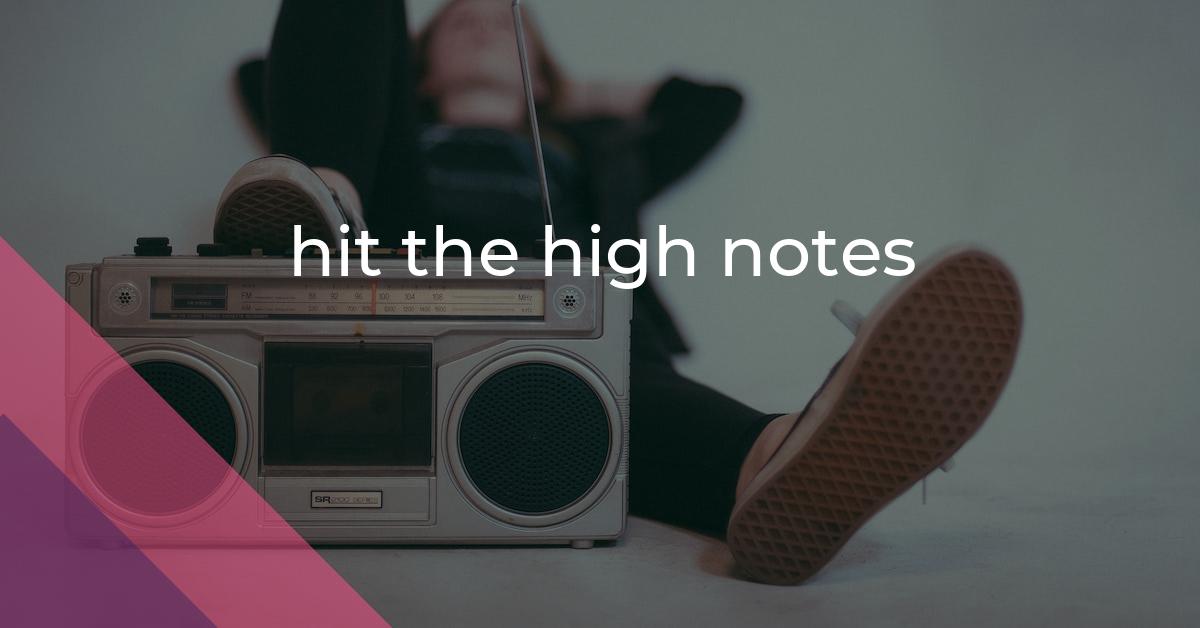hit the high notes: Idiom Meaning and Origin
What does ‘hit the high notes’ mean?
The idiom "hit the high notes" means to perform exceptionally well or achieve success, often in a skill or talent that involves reaching a peak or climax.

Idiom Explorer
The idiom "in high gear" means to be functioning or operating at a very fast or intense pace, usually with a lot of energy and enthusiasm.
The idiom "hit the roof" means to become very angry or furious about something.
The idiom "hit the nail on the head" means to accurately identify or pinpoint the main point or issue. It is used when someone makes a statement or observation that is exactly right or correct in every detail.
The idiom "hit the jackpot" means to achieve a great success or obtain an unexpected, significant gain, often in a financial sense.
The idiom "hit the buffers" means to reach a point of failure or complete downfall, often used to describe a sudden end or setback in one's progress or plans.
"Hit the big time" is an idiom that means achieving great success or fame, often referring to someone who becomes very successful in their career or achieves a high level of recognition. It implies reaching a significant, noteworthy position or achieving a major breakthrough in one's life or profession.
The idiom "hit one out of the ballpark" means to achieve outstanding success or accomplish something extremely impressive or remarkable.
The idiom "hit it up" means to begin or start something, often with enthusiasm or energy.
The idiom "hit it big" means to achieve great success or win a large amount of money, often unexpectedly or after a long period of hard work.
Decoding Vocal Range
The idiom "hit the high notes" has multiple meanings, with its origins rooted in the realm of music. To "hit the high notes" can refer to singing or playing a musical instrument skillfully, particularly when reaching the uppermost, more challenging pitches. It can also be used metaphorically to describe successfully achieving a goal, delivering an impressive performance, or meeting high expectations.
Within the context of music, "hitting the high notes" carries the technical aspect of executing demanding vocal or instrumental passages. This idiomatic expression is commonly associated with opera, where singers showcase their vocal range and prowess. The phrase signifies the ability to reach and sustain the upper register, which requires precision, control, and vocal dexterity. From a musical standpoint, "hitting the high notes" demonstrates a level of mastery or competence in performing intricate melodic lines.
Metaphorically, "hitting the high notes" extends beyond the domain of music to encompass various situations where exceptional performance or achievement is required. The idiom is frequently employed in settings such as sports, business, or public speaking to signify surpassing expectations or excelling in a challenging task. In this sense, "hitting the high notes" implies rising above average or ordinary levels, impressing others, and garnering acclaim.
The idiom "hit the big time" is related to "hit the high notes." While "hit the high notes" focuses more on achieving excellence or surpassing expectations in a particular performance or task, "hit the big time" expands on that notion by referring to achieving enormous success or fame on a larger scale. When someone "hits the big time," they have reached a level of recognition and accomplishment that sets them apart from their peers. It typically implies achieving widespread acclaim, fortune, or notoriety in their chosen field.
The etymology of the idiom "hit the high notes" traces back to the world of music, where hitting high-pitched notes accurately and expressively has long been regarded as a hallmark of skill and talent. The phrase likely emerged from the observation of accomplished singers who flawlessly executed demanding vocal parts, captivating audiences with their ability to effortlessly reach and sustain the higher registers.
While its exact origin remains uncertain, "hit the high notes" entered common usage during the late 19th and early 20th centuries. The idiom's metaphorical extension beyond music emerged as its popularity grew, reflecting society's tendency to adopt and adapt musical terminology to broader contexts.
In addition to "hit the big time," there is another related idiom: "hit it big." While "hit the high notes" emphasizes achieving excellence in a particular performance or task, "hit it big" emphasizes achieving significant success, especially in terms of financial gains or widespread recognition. When someone "hits it big," they have achieved a breakthrough or a major accomplishment that propels them to a higher level of success.
The enduring appeal of "hitting the high notes" as an idiomatic expression lies in its ability to capture the imagination and inspire individuals to strive for excellence. The idiom encapsulates the human aspiration to achieve greatness, skillfully navigate challenges, and leave a lasting impression. As language continues to evolve, this idiom may further expand its figurative reach, becoming more nuanced and multifaceted, mirroring the complexities of human endeavor.
Example usage
Examples of how the idiom "hit the high notes" can be used in a sentence:
- She hit the high notes during her opera performance, impressing the entire audience.
- The singer struggled to hit the high notes in the song, causing her voice to crack.
- He had been practicing for weeks and finally hit the high notes perfectly during his solo.
More "Music" idioms



